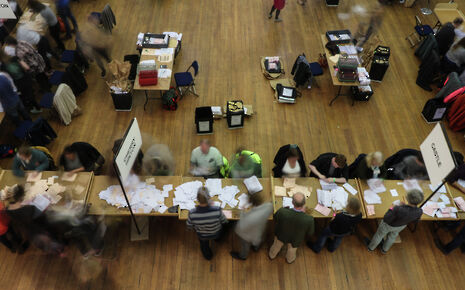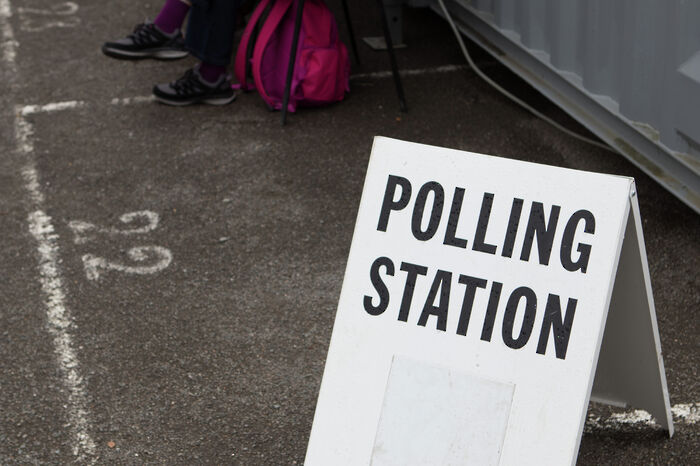Want to take back control? Vote in today’s council elections
Gabriel Barton-Singer argues that voting in local elections today offers a real chance to change the issues that influenced the Brexit vote

Today, Thursday 3rd of May, Cambridge residents have a chance to take back control. For a day you become the hirers and firers of your nearest branch of government. It is through these representatives, and through these elections, that the citizen gets a chance to take back control. Indeed local government is the most important type of government for the kind of ‘control’ that people actually tend to mean when they talk about having control over their lives: buses, schools, hospitals, bin regulations, potholes – all these boring aspects of local life come under the aegis of your plain-old local council.
The genius of ‘take back control’ as a wider political slogan in national politics was that it chimed perfectly with what people felt: that they have no control over their lives. Presumably if it has been magicked away by Brussels bureaucrats, it can be magicked right back. Here’s the plain truth: it can’t be. The kind of laws that are crafted at the European level are the kind that would either be drafted far beyond your control at Westminster, or be ones which can only be by necessity dealt with at the international level.
90% of what people wanted when they voted to leave Europe were matters that you can vote to change today
The irony is that in a strange way the EU itself is part of a search to regain control over a globalised world and economy. People were persuaded, in the name of restoring sovereignty, to throw away their only effective tool of having any ‘sovereignty’ or control over the multiplicity of problems and crises that are too big for one country to handle alone. From climate change to tax evasion, from trade treaties to modern military intervention, a nation-state of our size is normally much better served working as a continental bloc. We do not gain control by giving up a seat at the table – we lose our only chance of control.
Although you can ‘take back control’ from somewhere, you can’t always put it somewhere else of your choosing. Of course, the regained power will end up somewhere, some of it may even be in Westminster. And yes, sometimes the EU did overreach from its appropriate powers, though not half as much as the Daily Mail claimed. But in what real sense will you, the citizen, have regained control if Westminster is now able to decide banana regulations? In a country of 65 million people, the answer is not very much. Under our present electoral system, even less so. The control can never be ‘regained’ or ‘restored’ back to an angry populace – it just isn’t possible. Instead, it will be moved and partly destroyed.
The phrase itself invoked a kind of aggression – take, seize, grab, capture. An aggression built on the demonisation of politicians that has been drip-fed by journalists, comedians, satirists and, well, other politicians. Of course people felt that it resonated. Its aggression also played into its nostalgia; ‘take back’ could as well have been ‘turn back’ evoking the notion of turning back the clock. “Take back control!” leered Nigel Farage, and for the people who were listening they heard exactly what they wanted to hear – turn back the clock to when there were more white faces, post offices, branches of Woolworths and hangings. The words invited a whole fantasy of remembering and selective forgetting.
And yet, the phrase was profoundly duplicitous. People felt that it meant ‘fund my hospital’ or ‘sort out my noisy neighbours’; people could project onto it whatever meaning they wanted. The fact remains that 90% of what people wanted when they voted to leave Europe were matters that you can vote to change today. Yet turnout in local elections barely scrapes above 40% in Cambridge and in the European referendum it was sky-high – perhaps in a better world it would have been vice versa.
Today is also a chance to say that you do not accept the politics of take back control: that you reject its crude offer of simple solutions and political extremes in an age that surely requires more nuance than ever. The nuance, for example, to know that your local vote isn’t just about potholes and policy, but also about the message you send nationally – the way you make politicians reconsider the feasibility of their fragile electoral coalitions. Angus Groom was right to say that you should mostly vote on local issues – but it would be wrong to say that this voting can’t have a national impact too.
When I vote today I will not just be voting to return good councillors to pursue sound policies but also to send a strong message to the two main parties that Remainer votes cannot be taken for granted. My vote will not just be a vote to take back control but it will also be a vote against the politics of take back control. Voting today for your boring old local councillors is the only real chance you’ll get in a modern democracy to get back even the semblance of control.
Gabriel Barton-Singer is the Chair of the Cambridge University Liberal Association
 News / SU reluctantly registers controversial women’s soc18 December 2025
News / SU reluctantly registers controversial women’s soc18 December 2025 News / CUP announces funding scheme for under-represented academics19 December 2025
News / CUP announces funding scheme for under-represented academics19 December 2025 Features / Should I stay or should I go? Cambridge students and alumni reflect on how their memories stay with them15 December 2025
Features / Should I stay or should I go? Cambridge students and alumni reflect on how their memories stay with them15 December 2025 Fashion / The art of the formal outfit 18 December 2025
Fashion / The art of the formal outfit 18 December 2025 News / Dons warn PM about Vet School closure16 December 2025
News / Dons warn PM about Vet School closure16 December 2025










